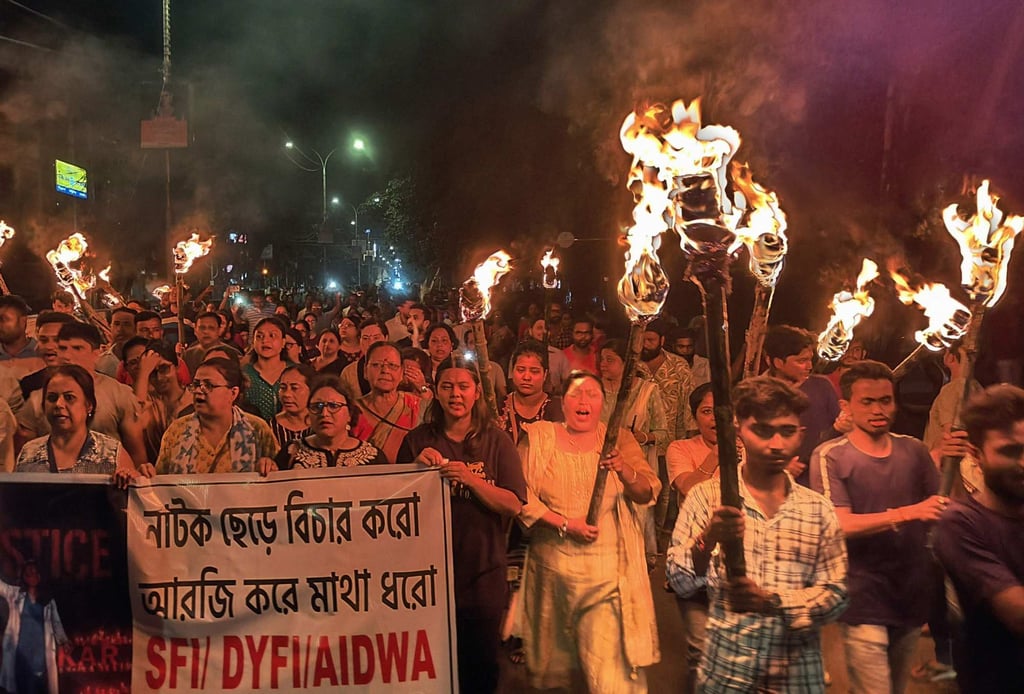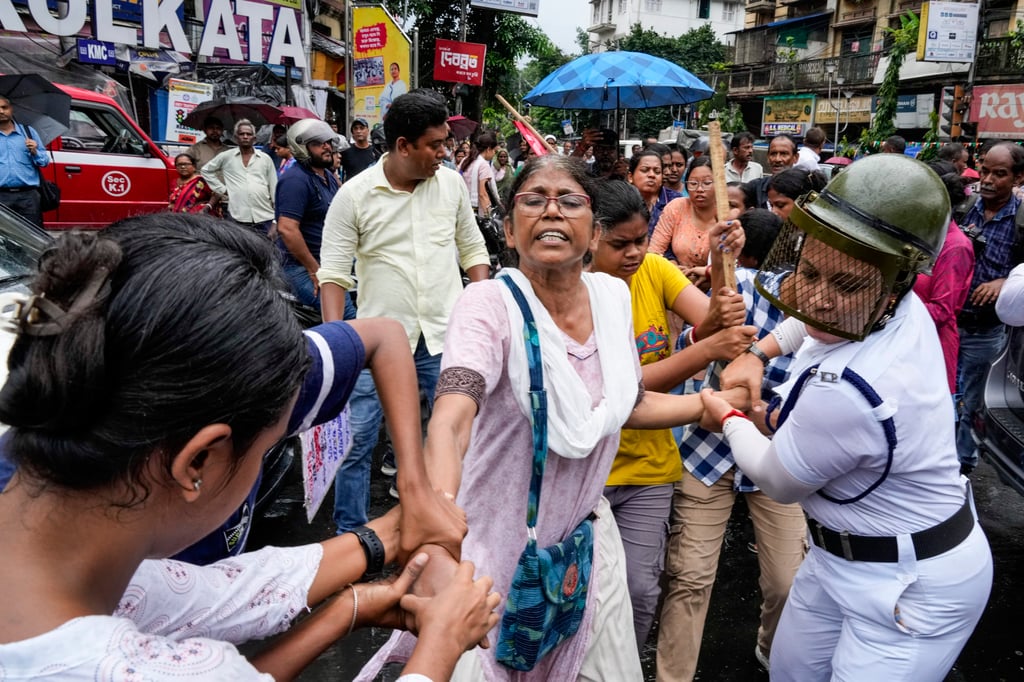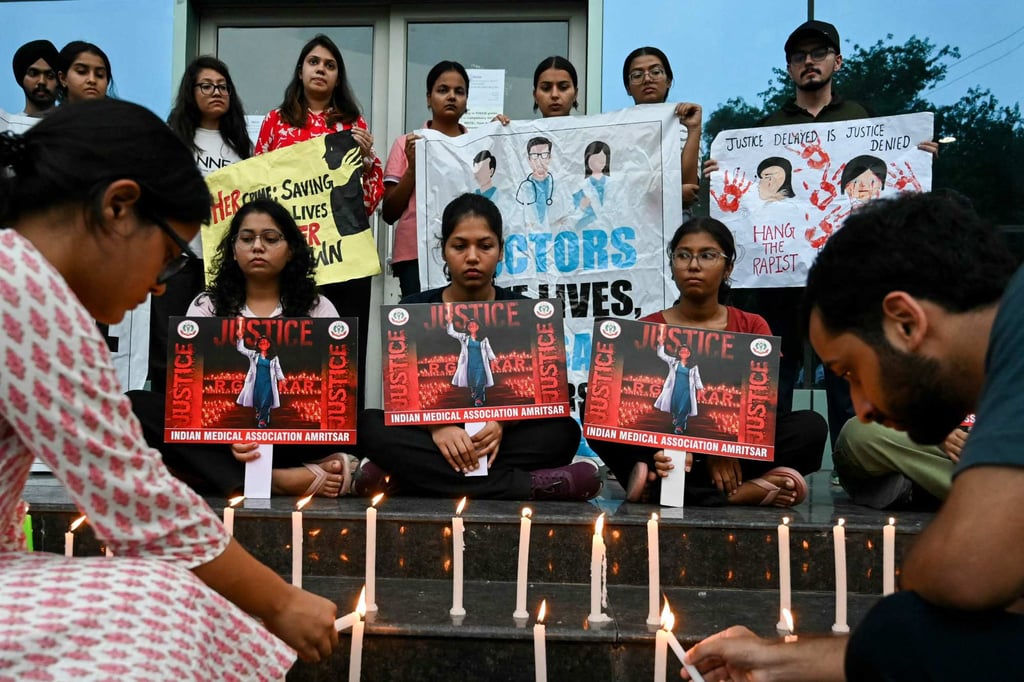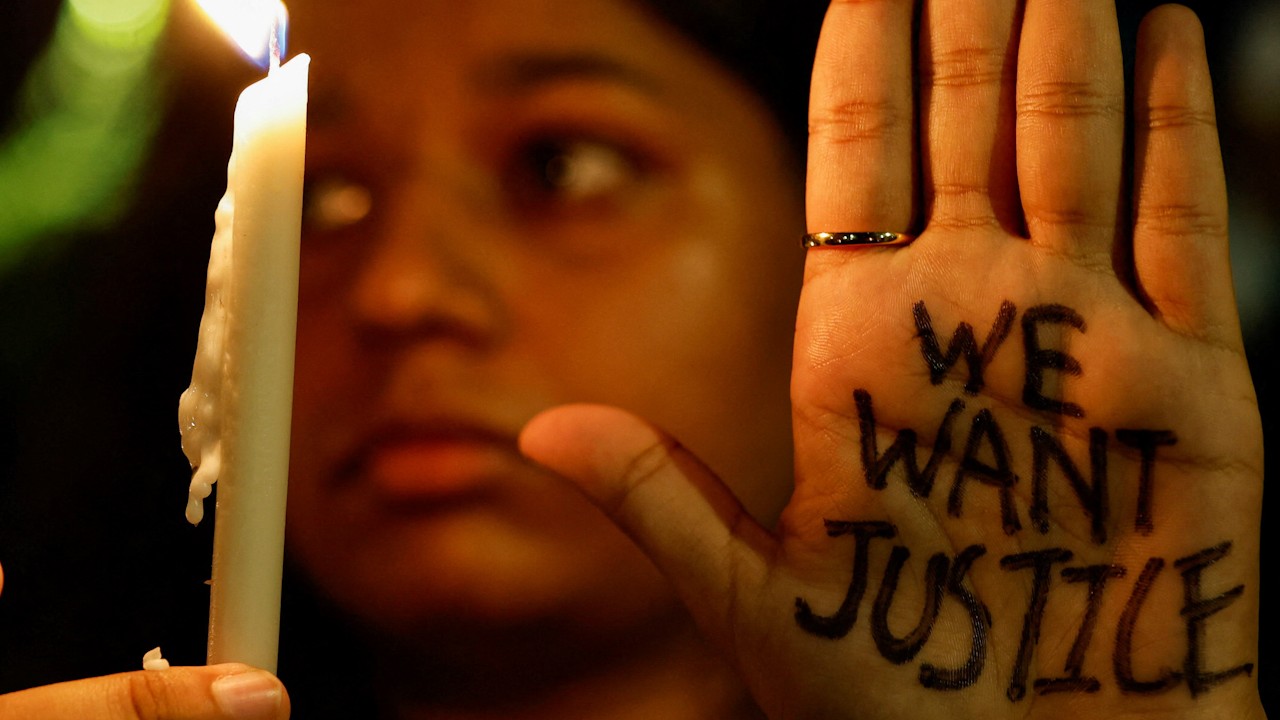“We are angry as this is personal,” said Koyel Ghosh, a 35-year-old non-binary queer feminist activist who helped organise overnight “Reclaim the Night” protests in the wake of the tragedy. “As individuals, our personal angst has fuelled our political will to rise in resistance”.

Physiotherapist Amrita Bhattacharya, 27, was repeatedly tear-gassed by police during the demonstrations, even as she watched them allow a mob of armed men to storm the hospital premises and destroy property. She said the doctor’s killing had shaken her sense of security in a city where she once felt safe.
“Women’s safety has deteriorated gradually,” she told This Week in Asia, recalling how in 2014, she was able to travel on buses filled with men late at night without facing any sexual abuse – but has since been molested on the metro multiple times in one week.
The irony is not lost on Kolkata’s women that their personal safety appears to have deteriorated under the leadership of a woman chief minister, Mamata Banerjee, and her All India Trinamool Congress. After all, it was Banerjee’s party that overthrew the Left Front’s 34-year stranglehold on West Bengal in 2011 with promises of greater protections for the state’s citizens.
Yet Banerjee’s own track record on women’s issues has been decidedly mixed. In 2012, she dismissed the gang rape of a woman in Kolkata as a “fabricated incident”. And in the recent case of the 31-year-old trainee doctor, authorities initially labelled it a suicide, only backtracking after public outcry.
Sumana Mukhopadhyay, a 52-year-old protester and theatre artist, alleged that there had been an attempt by authorities and the police to shield those who are guilty from facing justice. “We want the investigative agency to arrest the guilty and the court to grant them severe punishment so that such incidents are not repeated,” Mukhopadhyay said.
The handling of the case has indeed raised troubling questions. College principal Sandip Ghosh, who resigned amid the scandal, is now being questioned by the Central Bureau of Investigation (CBI) over why the initial ruling was suicide. An anonymous former student claims there are unanswered queries about alleged tampering of the crime scene, the hurried cremation of the victim’s body, and the hospital’s decision to allow renovation work following the incident.
A parliamentarian from Banerjee’s party who declined to speak on the record said that Kolkata police had made at least one arrest related to the case, even as the CBI investigation continues.
She insisted that the state government had taken measures to improve women’s safety, like launching a “Helpers of the Night” programme to assist women working evening shifts.
“Women can approach women police stations if male police refuse to listen to them,” the parliamentarian said.
Knee-jerk and piecemeal steps will never work … We need structural changes
Yet legal experts argue that such ad hoc solutions are woefully inadequate. Advocate Jhuma Sen has petitioned the Calcutta High Court, demanding the state government detail the structural reforms and accountability measures it has implemented to ensure workplace safety for women, in line with Supreme Court guidelines.
“Knee-jerk and piecemeal steps will never work,” Sen said. “We need structural changes.”
Kolkata – often hailed as the cultural capital of India – was the birthplace of the country’s first woman doctor, Kadambani Bose Ganguly, back in 1886. The city also led pioneering social movements on widow remarriage, the abolition of polygamy, and women’s education in the pre-independence era.
But today, this bastion of progressive ideals has seemingly devolved into a city thriving only on money and political power, Sanskrit lecturer Basu said.

Illusion of security shattered
Women’s rights activist Dolon Ganguly laments that the scourge of sexual harassment has even crept into Kolkata’s protest rallies. She has noted a troubling shift, where the city’s traditionally “protective” and polite men have given way to a new breed of “macho, aggressive, misogynistic and intolerant” figures.
Many residents now fear their city could follow a similarly dangerous trajectory to that of New Delhi, which reported 1,204 rape cases last year – the highest in the country.
Patralika Mukherjee, a 50-year-old production company director, said a woman’s safety in Kolkata often hinges on her socioeconomic background. She took solace in the fact that the city had avoided the types of brutal rapes and murders seen in northern India. But that illusion of security has been shattered.
Analysts point to rising unemployment and the crumbling of Kolkata’s once-vaunted education system as the cause of the crisis. In fact, the state has seen more than 3 million jobs vanish from unincorporated enterprises since 2015-16. And a civic volunteer programme, meant to fill gaps, has instead become a breeding ground for political patronage and gender-insensitive recruits accused of criminal acts – including this month’s killing of the trainee doctor.

City clubs that used to be hubs of learning, athletics and cultural enrichment have now been overtaken by unemployed, uneducated men who are all too often the perpetrators of harassment against women, according to Basu.
“The ruling party feeds these clubs with donations and legitimises their activities, making the city unsafe for women,” she said.
Despite all this, 44-year-old filmmaker Debarati Gupta thinks Kolkata is still “one of the safest cities” in India. She blames the “sheer negligence” towards academic standards and teacher appointments, especially in government colleges, for eroding the moral fibre of the younger generation.
Women’s rights activist Ganguly also sees a glimmer of hope in the current “rage and sense of togetherness” sweeping Kolkata’s streets. This sporadic movement, Basu believes, may yet chart an “alternative path to reform” – if the city’s leaders have the courage to confront the crisis head-on.


